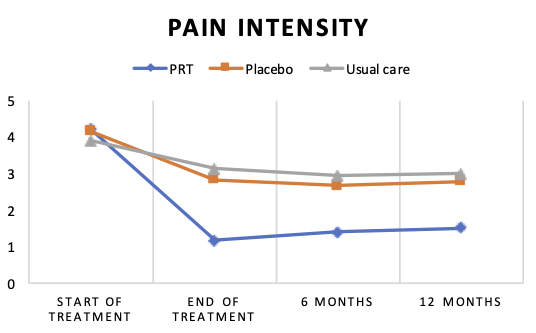Pain Reprocessing Therapy: Free Initial Consultation
Book a 15-minute free initial consultation to discuss how Pain Reprocessing Therapy can help you.
Alan Szmelskyj, an osteopath, hypnotherapist and Pain Reprocessing Therapy Practitioner with over 30 years of experience treating chronic pain.
Pain Reprocessing Therapy (PRT) is a groundbreaking, evidence-based treatment for chronic pain. It has been developed using the most up-to-date research into how our brains process and respond to pain signals.
Pain Reprocessing Therapy offers an innovative approach to managing chronic pain by retraining the brain’s response to pain signals so that it no longer experiences sustained discomfort, helping individuals suffering from chronic pain reclaim their quality of life.
Effective
Nearly all patients (98%) experience significant pain relief and two-thirds (66%) achieve full or almost full resolution of their pain.
Long-lasting
Research shows that the pain relief obtained through Pain Reprocessing Therapy persists for at least one year.
Fast-acting
Patients who undergo Pain Reprocessing Therapy report feeling an improvement in their symptoms after just a few sessions.
Chronic pain is now understood to be a condition that is caused by changes in the way the brain processes and responds to pain signals.
These changes can occur as a result of initial tissue damage or medical condition, but they can also be triggered by psychological factors such as stress, anxiety, and depression. This type of chronic pain is now referred to as neuroplastic pain.
One of the key changes that occur in the brain of chronic pain patients is an increase in fear and avoidance. This means that people with chronic pain start to become afraid of activities or situations that they think might make their pain worse. They then start to avoid these activities or situations, which can lead to a vicious cycle of increasing fear and avoidance. This is known as the pain fear cycle.
Pain Reprocessing Therapy takes advantage of the new understanding of chronic pain to provide an effective, long-lasting treatment that can achieve a complete resolution of even long-standing chronic pain.
Pain Reprocessing Therapy works by retraining the brain to deactivate pain signals.
Related reading: Structural Versus Neuroplastic Pain
The Evidence
In a randomized controlled trial published by JAMA Psychiatry in 2021, 151 people with mild to moderate chronic back pain were recruited and randomized to receive one of three treatments:
All patients were asked to rate their pain sensations intensity before starting the treatment. Four weeks later, participants rated their pain levels again and underwent fMRI scans to examine their brain activity.
At the end of four weeks, 66% of people who underwent PRT said they were either pain-free or nearly pain-free. In contrast, only 20% of those receiving placebo injections and 10% of those getting usual care reported similar improvements.
Patients-reported improvements in pain intensity were supported by fMRI scans. The brains of people who underwent Pain Reprocessing Therapy had significantly decreased activity in the areas responsible for pain processing and increased activity in the regions associated with positive emotions.
Remarkably, when the researchers followed up one year later, the improvements in pain were maintained without further therapy.

Other studies, currently in publication, show similar results.
This suggests that Pain Reprocessing Therapy is an effective way to break the pain cycle and successfully and permanently treat chronic pain.
All types of chronic neuroplastic pain are likely to respond to Pain Reprocessing Therapy, including:
Pain Reprocessing Therapy typically involves around ten sessions, but it’s fixed. This therapy is individualised to your needs, meaning the duration and pace can vary.
Some patients might need extra time for Somatic Tracking, while others may benefit from a greater focus on harnessing positive emotions. The PRT journey isn’t strictly linear—it often involves revisiting previous stages to reinforce progress.
Our PRT practitioner will expertly personalise the therapy to your unique needs, increasing your chances of fully recovering from chronic pain.
The therapist collects information about your pain, medical history, and previous treatments. This information helps to individualise your therapy to your unique circumstances.
The therapist guides you through the latest neuroscience findings on chronic pain, helping you understand how your brain and central nervous system generate and maintain pain, as well as the role of the pain-fear cycle in sustaining chronic back pain.
During this stage, you explore the specifics of your pain experience under the guidance of your therapist. This helps confirm that your back pain is due to faulty pain processing in the brain, not physical injury or tissue damage.
Somatic tracking is an innovative technique where you attentively focus on your pain without reacting to it. The goal of somatic tracking is to change your relationship with the sensation, observing and understanding it from a more objective and neutral perspective.
During this stage, the therapist helps you address any emotional responses that may be contributing to your chronic pain. This can include fear, anxiety, or stress associated with the pain.
Lastly, you're guided to focus on positive feelings and sensations, harnessing the power of positive psychology to aid in pain relief.
Book a 15-minute free initial consultation to discuss how Pain Reprocessing Therapy can help you.
Over 30 Years of Experience in Pain Management
Alan Szmelskyj
DO, MSc, Adv Dip Clin Hyp, FRSPH
Alan has been practising as an osteopath for over 30 years. He has also authored many scientific publications and lectures nationally and internationally.
Alan has always been interested in the neuroscience of chronic pain, particularly with respect to patients who do not respond to standard treatments.
This interest led him to train in new pain management approaches, such as hypnotherapy for pain and Pain Reprocessing Therapy. Alan is one of only a few Pain Reprocessing practitioners in the UK trained and certified by The Pain Reprocessing Therapy Center.

Book your initial appointment.
Our easy-to-use online appointment system is available 24/7.